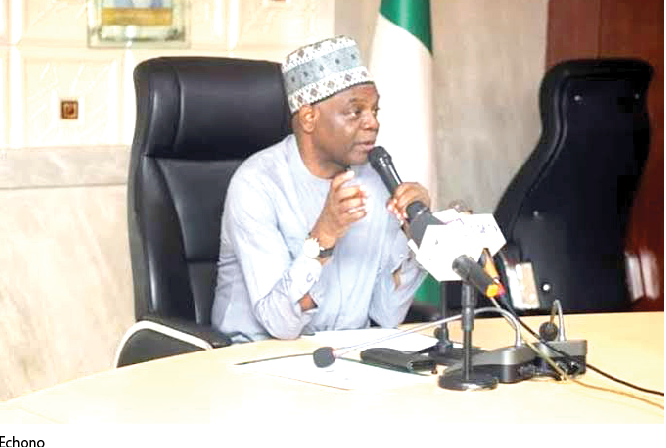The Tertiary Education Trust Fund (TETFund) Research for Impact Initiative (R41) has become a pivotal force in advancing Nigerian research to the global stage.
This is evidenced by the recent $250,000 Science Granting Councils Initiative (SGCI) grants awarded to four exceptional teams of researchers from Nigeria.
Following the successful implementation of R41 under the auspices of TETFUND, four teams were shortlisted to advance their developed ideas through a collaborative research grant established under the Science Granting Councils (SGCs) with Innov8 Technology Hub as the technical partner.
Project proposals were reviewed and shortlisted based on the objectives and eligibility criteria stipulated in the call.
Crucial conditions considered included problem focus, solution orientation, innovation, the potential for commercialization, policy relevance, collaboration, team-based and multidisciplinary approach, gender and inclusivity, and socio-economic impact.
LEADERSHIP reports that over 17 researchers were shortlisted under four research projects after reviewing their proposals.
Project one titled; “Development of technology to mitigate the effect of drought in desert areas of northern Nigeria has Dr. Hussaini Mohammed Majiya of Ibrahim Badamasi Babangida University Lapai, Niger state, Dr. Masud Sadiq Eneji of Usman Dan Fodio University, Sokoto, Prof. Sani Mohammed Yahaya of Aliko Dangote University of Science and Technology, Wudil Kano state and Dr. Again Leonard Chimnobi of Federal University of Technology, Owerri, Imo state.
Team two with a project titled; “Development of automated garri frying technology (Jollyfryer),” has Prof. Mohammed Nasirudeem Suleiman of Federal University Lokoja, Dr. Mask Felix Bitrus, Plateau state university, Books, Dr. Ibrahim Gana Geidam, Yobe state University, Damaturu, Engineer Dr. Joseph Onah Ukpata, University of Cross River state, Calabar and Dr. Cecilia Oluwamodupe of Olusegun Agagu University of Science and Technology, Okitipupo, Ondo state.
The topic in team three is “Creation of biosensor device for water purification using solar energy. It has Prof. V.O Nwsugo of Abia state University, Uturu, Dr. Usman Waziri, Bauchi state University, Gadau, Prof. Osita Chiaghanam of Chukuemeka Odumegwu Ojukwu University and Dr. Oluwaseun Babalola of Lagos State University.
Meanwhile, team four under the title, “Sir volt:An affordable access to electricity with vertical axis wind turbines has Dr. Abdullahi Bala Kunya, Ahmadu Bello University, Zaria, Dr. Abdulsalami Ismaila Galadims, ABU, Dr. Ramatu Idris Sha’aba, ABU, Dr. James Enam Samson, ABU and Dr. Rashidatu Abdulazeez, ABU.
Through this initiative, TETFund has strategically partnered with Innov8 Technology Hub to provide technical support, ensuring that the research teams have the resources and expertise needed to advance their projects.
The SGCI grants, a testament to the high caliber of Nigerian research, offer substantial financial backing, enabling these teams to focus on innovative solutions and impactful discoveries.
This collaboration underscores TETFund’s commitment to nurturing homegrown talent and fostering a robust research ecosystem in Nigeria.
The grant originated from the SGCI, a multi-funder initiative aimed at strengthening the capacities of 17 Science Granting Councils (SGCs) in sub-Saharan Africa.
It would be recalled that TETFund is one of 17 members of the Sub-Saharan Africa Science Funding Councils Initiative (SGCI) which seeks to strengthen Science Financing Councils in supporting research and evidence-based policies that contribute to the socioeconomic development of countries.
At the project inauguration and initial bootcamp of SGCI funding in Abuja on Monday, Dr. Saliba Girei Bakare, the director of research and development, TETFund said, though Nigeria joined the SGCI in 2020—five years after the program’s inception—the impact of this collaboration is poised to be transformative.
According to Bakare, the $250,000 grant will support four Nigerian research teams, each working on projects with the potential to drive significant change.
Among these initiatives are advancements in the processing of garri, a staple food, and pioneering efforts in renewable energy, amongst others.
He said the funding aims to bridge the gap between research and practical application, fostering innovations that can be commercialised.
He further explained that a critical component of the grant is its focus on helping research teams develop their innovations into market-ready prototypes.
This, he said involves not only technical development but also pitching these products to industries, ensuring that the research translates into tangible economic benefits.
“This is a grant that is provided to the participating countries and Nigeria joined the SGCI in 2020.
“So, we actually joined late, the programme started in 2015 and if we had joined earlier, we would have gotten different grants by now but it’s better late than never
“We joined in 2020, we got these grants of shout 250,000 US dollars for four participating groups.
“The essence is to help them transform their research findings into commercializable goods and services in this country.
“As you have seen, some are working on processing of garri, others are working on renewable energy and so and so forth.
“So, four teams are going to use this money that would help to develop their research into prototypes and pitch them with industries so that there will be take off of the product coming out from the research,” he said.











